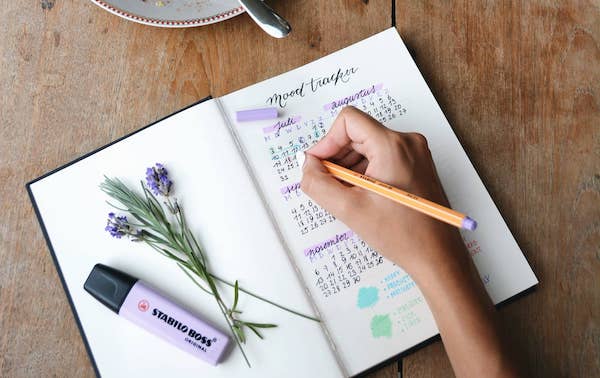Do you want to start journaling but are you not sure where to start? In this blog, we share 7 tips for creating an effective journaling routine.
Estimated reading time: 11 minutes
As highly sensitive people (HSP), we know how difficult it can be to get through life while wearing our emotions on our sleeve.
From wrangling an expanding professional career to dealing with the dynamics of social life, these feelings can wear us down.
One of the most effective tools to reduce the fatigue and sensation of being bogged down is expressing our inner-most thoughts in a journal.
Using a sophisticated cross pen can enhance this experience, making the act of journaling feel more intentional and luxurious.
Journaling, when completed on a day-to-day and week-to-week basis, can help us better understand our thoughts, emotions and point of view.
7 Tips For An Effective Journaling Routine
As you may know, living with an HPS trait often makes it difficult to decipher and filter our feelings on any given day.
If this sounds like you, here are some tips for an effective journaling routine that you may find helpful.

1. Date Every Entry
When we begin to write in a diary, the thought of dating each entry sounds burdensome.
For some of us, the idea of dating a paper takes us back into our school years, which causes anxiety to build. However, having an archive of your feelings and ideas as the years progress is an efficient tool for healing and change.
Can you recall a time in your younger life where things were chaotic? Having a journal in those moments, and being able to go back and reflect on them in the present moment, would have given great insight into how you’ve developed over the years.
Whether we realize it or not, a great way to become more in tune with ourselves is by loving and accepting who we are at any given moment in our past.
While your journaling routine may change and shift in the future, always make a habit of dating each entry.
A few years from now, when you go back and reflect on your day, you will be thankful you did.
2. Thought Flow
As individuals with the HSP trait, we know what it’s like to filter our thoughts and change our words to fit the social narrative. In our journal, however, we don’t need to do this.
The next time you write a diary entry, let the thoughts flow naturally onto the paper. Rather than edit and change the phrases in your mind, write them in their pure, raw and unadulterated form.
Society has cold and harsh ways of making people like us conform to societal norms. While it may help us within an academic environment or professional setting, it blunts our ability to process emotions and feelings.
By creating a journaling routine that compliments our organic thought pattern, we become a better version of ourselves.
3. Be Unapologetically You
For highly sensitive people, experiencing emotions can be likened to getting hit by an avalanche of emotional and mental stimulation. For most people, they can brush these instances off and return to their daily lives.
With us, it paralyzes our ability to move forward and maintain a productive schedule. As a coping mechanism to deal with these issues, we’ve developed a mask that we wear to hide from the world.
Try to avoid the mask-wearing when developing your journaling routine. Do not filer or minimize your experience to make others more comfortable; be your true self.
4. Emotional Release
A good journaling routine can be a cathartic tool to release emotions that we’ve locked inside for years.
When society tells us to bottle up our emotions and never show our true nature, journaling encourages us to explore the emotional side of our character.
Do you refrain from discussing your HSP traits with friends, family members or coworkers for fear of ridicule?
If so, a journaling routine will act as a launching pad to explore your inner voice.
After years of suppression and silence, you may be surprised at what occurs when your pen meets the paper!
5. Cultivate Appreciation and Growth
Common issues that many individuals struggle with when they first start their journaling routine are overly-critical thoughts and judgement of their writing.
After reading an entry from the past, cast your criticisms to the side. Explore the thoughts and emotions that were stirring inside as you wrote those words.
Once you begin to paint a picture of yourself at that moment, use the lessons to find inner peace.
Although you may not agree with what you wrote, it was the catalyst for inner-change and growth.
We must learn to appreciate and accept our past if we want to experience positive change in the future.
6. Meditation
Although many people don’t associate meditation with emotional growth, science has long-since known the effects of daily mindfulness practice.
When you sit down in a quiet space to explore your inner stillness, recall back onto the words you wrote in your diary.
Use these words as a meditative anchor that roots you into the present moment, melting away negative thoughts or emotions.
You may be hesitant to try this method, and that’s OK!
Once you open yourself up to the practice of meditation, you will be shocked at how powerful a tool it is.
Meditation before journaling can also be a powerful exercise. Why not try this meditation for self reflection?
7. Don’t Stress Yourself
As we conclude, it’s important to remember not to become overly-stressed or burdened by your journaling routine.
If you’re having an overwhelming day, or you want to relax and watch The Office on Netflix for the 20th time, that’s perfectly fine!
Journaling, in a general sense, is a tool that allows you to process thoughts and emotions that would otherwise confuse or disarm you.
On the days that you feel as though the world is causing you internal conflict, put pen to paper.
Your journaling routine should assist you, not define you.
Is A Journaling Routine Right for You?
If you’re a sensitive person that becomes bombarded with emotional stimuli, a journaling routine will act as a filtering mechanism.
It will give you the power to still the chaos around you and help you develop inner wisdom.
Diaries can provide an unseen world of love and acceptance, where you author a version of reality that meets your standards.
It allows you to see that even though you may struggle with certain aspects of life, you’re not alone.
Try developing a journaling routine and see what hidden truths you discover as your pen crosses the paper!






